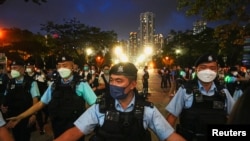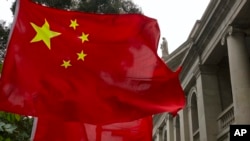On January 13, Xia Baolong, director of the Chinese State Council’s Hong Kong and Macao Affairs Office, delivered a speech calling for the “complete and accurate” implementation of Hong Kong’s National Security Law (NSL).
Beijing imposed the sweeping security law on Hong Kong in June 2020, after anti-government protests, the largest in the city’s history, convulsed the former British colony the previous year.
The law gave Beijing broad power to silence and punish dissent from the ruling Chinese Communist Party line. It provides for harsh penalties – up to life sentences – for a set of broadly defined national security offenses.
In his speech, Xia boasted of the law’s efficacy in “restor[ing] social order” in Hong Kong:
“In today’s Hong Kong, the rule of law is safeguarded, justice is upheld, and the legitimate rights of Hong Kong people are better protected in a safer environment.”
That is false.
On the contrary, as Polygraph.info has previously reported, there is abundant evidence that the NSL undermines justice and further erodes Hong Kongers’ rights and freedoms.
The NSL criminalizes four categories of activities: secession, subversion, terrorism and collusion with foreign entities. Those offenses are defined with sweeping language that has given authorities power to severely punish even peaceful acts of dissent.
The New York Times reported in 2020:
“Under the new law, damaging government buildings would be considered an act of subversion punishable by life imprisonment in ‘grave’ cases. Sabotaging transport would be deemed a terrorist activity punishable by life in prison if it harms other people or causes significant damage to public or private property.”
From the enactment of the NSL in June 2020 to September 25, 2022, 213 individuals were arrested for alleged national security crimes, the online magazine ChinaFile reported, citing Hong Kong police data. Of these, 125 were charged and 30 convicted.
Those arrests, made by the Hong Kong police National Security Department (NSD), a branch created under the law, “were mostly related to the NSL, but also to other crimes, such as sedition,” the magazine noted.
Hong Kong’s sedition law, a relic from the city's colonial area, had not been used for more than half a century until the 2019 protests. The NSD has been making national security arrests citing either the NSL or the sedition law and other criminal statutes.
According to the police statistics cited by ChinaFile, 75 individuals were arrested for alleged “seditious” or “secessionist” speech or materials, 69 for alleged “subversion,” 19 for alleged “collusion” with foreign entities and 19 for alleged “terrorism.”
“[T]he vast majority of arrests targeted activities that would be considered peaceful and constitutionally protected exercise of basic political and civil rights in other jurisdictions,” ChinaFile reported. “In fact, such activities would have been protected in Hong Kong itself prior to the NSL’s enactment in July 2020.”
A recent case was the arrest of six people on January 17 for allegedly producing, publishing and selling a “seditious” book about the 2019 pro-democracy protests.
Police officers from the National Security Department raided a stall at the fair in Hong Kong’s Mong Kok district, detaining three people. The others were arrested in Kowloon and the New Territories, Hong Kong Free Press (HKFP) reported. All six remain in custody on suspicion of engaging in “acts with seditious intention.”
According to multiple news reports, the police said the book advocated for Hong Kong’s independence and “incited others to overthrow the central and Hong Kong governments.”
“The 400-page volume of photographs and text chronicles the 2019 protests, and its cover is a picture of a police standoff with protesters in which a flag emblazoned with the now banned slogan ‘Liberate Hong Kong, revolution of our times’ is visible,” The Guardian reported.
“In the past, political and satirical products were a staple at Lunar New Year fairs,” wrote HKFP.
A college student, Lui Sai-yu, was charged with inciting secession in April 2021 for messages calling for "acts to be taken to unlawfully change the regime" in Hong Kong. He was sentenced to five years in jail in April 2022.
“The court heard that Lui had posted messages like ‘Liberate Hong Kong, Revolution of Our Time’ and ‘Hong Kong independence. The only way out,’ which were protest slogans during pro-democracy demonstrations in 2019,” Reuters reported. Lui has been in prison since his arrest in September 2020.
Similar accounts abound. Information on each of 213 arrests made by the National Security Department can be found here.
In its latest assessment of the situation in Hong Kong, the British government reiterated its concern over Beijing’s clamp down on the rights and freedoms in its former territory.
“Hong Kong’s autonomy is declining, and the pervasive, chilling effect of the National Security Law seeps into all aspects of society,” U.K. Foreign Secretary James Cleverly wrote in the foreword to London’s January to June 2022 report on Hong Kong.
“Freedoms are being systematically eroded by Beijing on multiple fronts, tightening the restrictions on the lives of ordinary Hong Kongers.
“The authorities continue to crack down on free speech, the free press, and free assembly. Individuals and civil society groups are censoring themselves, and most independent news outlets have been forced to close.
“The Hong Kong authorities continue to arrest and prosecute those who dissent, including high-profile figures, pro-democracy activists and politicians.”
The report detailed significant political developments during the period, including the closure of the website of the U.K.-based advocacy group Hong Kong Watch, the unopposed election of pro-Beijing hardliner John Lee as the city’s new chief executive, the NSD arrest of Cardinal Joseph Zen Ze-kiun for alleged foreign collusion and a police order banning the annual commemoration in Hong Kong’s Victoria Park of the 1989 Tiananmen Square massacre.
On March 30, 2022, two prominent British judges, including U.K. Supreme Court head Robert Reed, resigned as non-permanent judges on Hong Kong’s highest court.
"I have concluded, in agreement with the government, that the judges of the Supreme Court cannot continue to sit in Hong Kong without appearing to endorse an administration which has departed from values of political freedom, and freedom of expression," Reed said in a statement.
Reed’s resignation coincided with then-British Prime Minister Liz Truss stating that Hong Kong had reached a “tipping point” at which it was no longer tenable for British judges to serve there. Doing so “would risk legitimizing oppression,” she said.
Australian Judge James Spigelman also resigned from Hong Kong’s top court in September 2020, for reasons “related to the content of the national security laws,” the Australian Broadcasting Corporation reported.
Meanwhile, former Australian high court judge Patrick Keane was appointed to Hong Kong’s Court of Final Appeal on January 13, joining the remaining 10 non-permanent foreign judges on the city’s highest court.
Keane has dismissed criticism of the appointment, arguing that it is better for foreign judges to play a role than “vacate the field,” The Guardian reported on January 17.
In the high-profile national security case against Hong Kong media tycoon Jimmy Lai, a prominent critic of the Chinese Communist Party, the Hong Kong government attempted numerous times to ban British lawyer Timothy Owen from representing Lai, citing national security concerns.
“The use of foreign lawyers by both prosecutors and the defense have long been part of the former British colony's rule of law traditions,” Reuters reported.
After a local court said Owen could defend Lai, Hong Kong Chief Executive John Lee in November 2022 asked the National People’s Congress Standing Committee (NPCSC), China's top lawmaking body, to weigh in on the matter.
The Hong Kong high court then postponed the trial, originally scheduled to start on December 13, until September 25, 2023, giving time for Beijing’s decision.
On December 30, the NPCSC granted Lee the power to bar foreign lawyers from national security cases, “removing the decision from the city’s courts.”
That move generated concerns about the city’s judicial independence, Reuters reported:
“The NPCSC ruling said Hong Kong courts must now obtain approval from the chief executive before admitting any foreign lawyer without local qualifications to work on national security cases.
“If the courts do not do so, the city's national security committee, which is led by the chief executive and Beijing's liaison office chief, will make a decision on the matter.
“Under the national security law, the decisions made by the committee cannot be challenged by a judicial review.”
Lee stressed that the decision would only concern national security cases.
Lai has been in police custody since December 2020 for his part in the 2019 pro-democracy protests and unauthorized assemblies. He now faces a possible life sentence under the NSL for charges that include alleged foreign collusion. He had been sentenced on December 10 to five years and nine months in prison on fraud charges.
“Critics say the treatment of Lai is completely against the spirit of the rule of law and reflects the authorities’ determination to lock up the high-profile China critic for good,” The Guardian reported.
In October 2022, Hong Kong dropped three positions, to 22nd place, on the World Justice Project’s rule of law index. “The city’s score decreased by 2.8 per cent from last year, which marked the second-largest drop in the Asia-Pacific region, after Myanmar,” HKFP reported.
Eric Lai, Hong Kong Law Fellow at Georgetown University’s Center for Asian Law, wrote in The Diplomat magazine:
“The inherent contradiction between Hong Kong’s common law system – which appreciates protections of international human rights and the common law principles – and China’s socialist authoritarian legality, which disapproves of judicial independence and political liberalism, has repeatedly put Hong Kong’s legal system in turmoil in the past 25 years.”
A Reuters special report published late last year concluded that there has been “a campaign of intimidation” against Hong Kong lawyers “who take on human rights cases, have criticized a China-imposed national security law or raised alarms about threats to the rule of law.” As a result, human rights lawyers have been fleeing the city.
That’s apart from the numerous human rights lawyers put behind bars in the aftermath of the 2019 protests on NSL charges.
A report by Georgetown University’s Center for Asian Law published in 2021 concluded that the National Security Law constituted “one of the greatest threats to human rights and the rule of law in Hong Kong since the 1997 handover” from British to Chinese rule.
On January 16, China appointed Zheng Yanxiong, who had headed Beijing’s Office for Safeguarding National Security in Hong Kong since 2020, as the director of its Hong Kong Liaison Office, Beijing’s top Hong Kong post.
The U.S. has sanctioned Zheng for his leading role in the crackdown on the 2019 protests. Experts see his promotion as a signal by China that it will maintain a tough line on Hong Kong.







